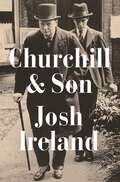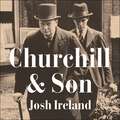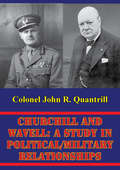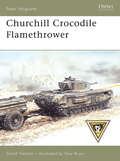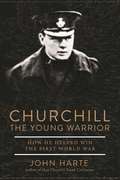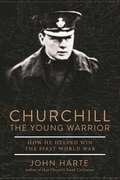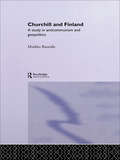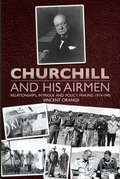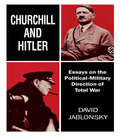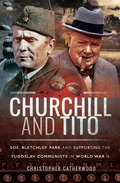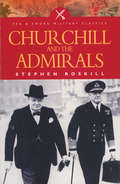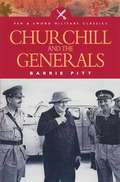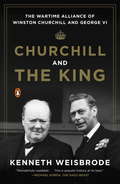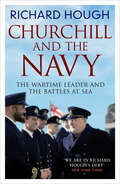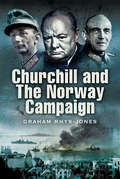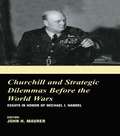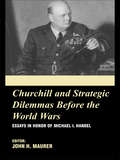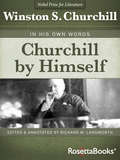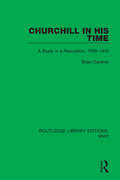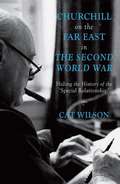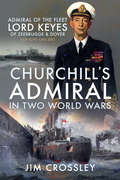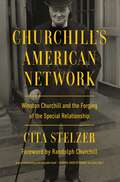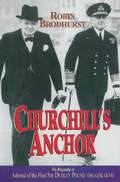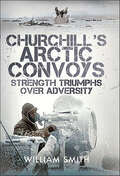- Table View
- List View
Churchill & Son
by Josh Ireland'A compelling tragedy, but one which casts valuable new light on the outsized human dimensions of both men ... Agonising but excellent' The Telegraph'In this fascinating account of the turbulent Churchill father-and-son relationship, Josh Ireland shows how central Winston and Randolph were to each other's lives' Andrew RobertsFew fathers and sons can ever have been so close as Winston Churchill and his only son Randolph. Both showed flamboyant impatience, reckless bravery, and generosity of spirit. The glorious and handsome Randolph was a giver and devourer of pleasure, a man who exploded into rooms, trailing whisky tumblers and reciting verbatim whole passages of classic literature. But while Randolph inherited many of his fathers' talents, he also inherited all of his flaws. Randolph was his father only more so: fiercer, louder, more out of control. Hence father and son would be so very close, and so liable to explode at each other.Winston's closest ally during the wilderness years of the 1930s, Randolph would himself become a war hero, serving with the SAS in the desert and Marshal Tito's guerrillas in Yugoslavia, a friend of press barons and American presidents alike, and a journalist with a 'genius for uncovering secrets', able to secure audiences with everyone from Kaiser Wilhelm to General Franco and Guy Burgess.But Randolph's political career never amounted to anything. As much as he idolised Winston and never lost faith in his father during the long, solitary years of Winston's decline, he was never able to escape from the shadow cast by Britain's great hero. In his own eyes, and most woundingly of all his father's, his life was a failure. Winston, ever consumed by his own sense of destiny, allowed his own ambitions to take priority over Randolph's. The world, big as it was, only had space for one Churchill. Instead of the glory he believed was his birthright, Randolph died young, his body rotted by resentment and drink, before he could complete his father's biography.A revealing new perspective on the Churchill myth, this intimate story reveals the lesser-seen Winston Churchill: reading Peter Rabbit books to his children, admonishing Eton schoolmasters and using decanters and wine glasses to re-fight the Battle of Jutland at the table. Amid a cast of personalities who defined an era - PG Wodehouse, Nancy Astor, The Mitfords, the Duke and Duchess of Windsor, Lord Beaverbrook, William Randolph Hearst, Oswald Mosley, Graham Greene, Duff and Diana Cooper, the Kennedys, Charlie Chaplin, and Lloyd George - Churchill & Son is the lost story of a timeless father-son relationship.
Churchill & Son
by Josh IrelandA moving and revealing new portrait of Winston Churchill through the most important relationship in his life - that with his son, Randolph.'In this fascinating account of the turbulent Churchill father-and-son relationship, Josh Ireland shows how central Winston and Randolph were to each other's lives' Andrew RobertsFew fathers and sons can ever have been so close as Winston Churchill and his only son Randolph. Both showed flamboyant impatience, reckless bravery, and generosity of spirit. The glorious and handsome Randolph was a giver and devourer of pleasure, a man who exploded into rooms, trailing whisky tumblers and reciting verbatim whole passages of classic literature. But while Randolph inherited many of his fathers' talents, he also inherited all of his flaws. Randolph was his father only more so: fiercer, louder, more out of control. Hence father and son would be so very close, and so liable to explode at each other.Winston's closest ally during the wilderness years of the 1930s, Randolph would himself become a war hero, serving with the SAS in the desert and Marshal Tito's guerrillas in Yugoslavia, a friend of press barons and American presidents alike, and a journalist with a 'genius for uncovering secrets', able to secure audiences with everyone from Kaiser Wilhelm to General Franco and Guy Burgess.But Randolph's political career never amounted to anything. As much as he idolised Winston and never lost faith in his father during the long, solitary years of Winston's decline, he was never able to escape from the shadow cast by Britain's great hero. In his own eyes, and most woundingly of all his father's, his life was a failure. Winston, ever consumed by his own sense of destiny, allowed his own ambitions to take priority over Randolph's. The world, big as it was, only had space for one Churchill. Instead of the glory he believed was his birthright, Randolph died young, his body rotted by resentment and drink, before he could complete his father's biography.A revealing new perspective on the Churchill myth, this intimate story reveals the lesser-seen Winston Churchill: reading Peter Rabbit books to his children, admonishing Eton schoolmasters and using decanters and wine glasses to re-fight the Battle of Jutland at the table. Amid a cast of personalities who defined an era - PG Wodehouse, Nancy Astor, The Mitfords, the Duke and Duchess of Windsor, Lord Beaverbrook, William Randolph Hearst, Oswald Mosley, Graham Greene, Duff and Diana Cooper, the Kennedys, Charlie Chaplin, and Lloyd George - Churchill & Son is the lost story of a timeless father-son relationship.(P) 2021 Hodder & Stoughton Ltd
Churchill And Wavell: A Study In Political/Military Relationships
by Colonel John R. QuantrillOn 21 June 1941 Churchill relieved General Archibald Wavell from command in the Middle East. This action followed a series of set-backs in the theatre during which Churchill had direct dealings with Wavell. Given the significant internal conflict within the British High Command during World War I, this action by Churchill was seen as symptomatic of yet another poor political/military relationship.A close examination of the British national command structure shows that while there was certainly inter-personal conflict between Churchill and his Chiefs of Staff, they still maintained an effective relationship. Churchill's strong personality, and penchant for becoming involved in military matters, may have reduced the potential effectiveness of this relationship but it still remained effective none-the-less.The relationship between Wavell and the British High Command was similarly effective, despite personal conflict between him and Churchill. The High Command provided Wavell with broad strategic guidance, the resources to implement it, and allowed him a relatively free hand to do so. It was only when he strayed from strategic guidance that he came into conflict with the High Command.Following a brilliant opening series of campaigns in North and East Africa, Wavell lost his broad strategic vision. He allowed part of his limited forces to be dissipated to Greece at a critical time, while under-estimating the implications of German intervention in North Africa. He then failed to appreciate the strategic implications of Axis threats to both Iraq and to Syria, and finally he allowed himself to be pressured into a premature counter offensive in the Western Desert. It is argued that it was these errors which caused Wavell's dismissal, and not a failing in the political/military interface.
Churchill Crocodile Flamethrower
by Tony Bryan David FletcherA fire-breathing 'monster' on the battlefield, the Churchill Crocodile flamethrower was one of the most devastating and awe-inspiring weapons of the Second World War. Tank expert David Fletcher chronicles the development of the flamethrower tank, detailing the variants of the Crocodile and examining the dramatic effects of these tanks in battle from D-Day to the dramatic flamethrower attack on the River Senio in Italy. Revealing the strengths and weaknesses of the flamethrower tanks, Fletcher investigates the post-war use of Crocodiles to burn down and sterilize the site of Belsen concentration camp, as well as their mobilization for the Korean War, and post-war developments to the prototype Centurion Crocodile. In addition to the role of the Churchill Crocodile on the battlefields of Western Europe, the various wheeled flamethrowers designed for home defense in Britain during World War II are examined. Researched using the papers of Reginald Fraser- the genius behind the flamethrowers and dramatically illustrated with detailed artwork and previously unpublished contemporary photographs, this book brings to life the true terror of these tanks.
Churchill The Young Warrior: How He Helped Win the First World War
by John HarteThis is the intriguing chronicle of Winston Churchill’s early years as a young soldier fighting in several different types of wars—on horseback in the cavalry at Khartoum, with saber and lance against the Dervishes at age twenty-two, in the South African war against the Boers, and finally in the First World War after he resigned as First Lord of the Admiralty, to volunteer to lead a Scottish brigade in the trenches of the Western Front, as Lieutenant-Colonel. The book also covers the failure, bloodshed, and disgrace of Gallipoli that was blamed on him, which could have led to his downfall, as well as the formative relationships he had with the two important women in his young life - his mother, Jennie, who was an eighteen-year-old woman when she married an English aristocrat, and Churchill’s young wife, Clementine. How did the events of his early life shape his subsequent life and career, making him the leader he would become? What is the mystery behind how World War I erupted, and what role did Churchill play to end it?Most readers are aware of Churchill’s leadership in World War Two, but are unaware of his contributions and experiences in World War One. Through engaging narrative non-fiction, this book paints a startlingly different picture of Winston Churchill - not the portly, conservative politician who led the UK during World War II, but rather the capable young man in his 20s and 30s, who thought of himself as a soldier saving Britain from defeat. Gaining experience in battle and developing a killer instinct and a mature worldview would serve him well as the leader of the free world.
Churchill The Young Warrior: How He Helped Win the First World War
by John HarteThis is the intriguing chronicle of Winston Churchill’s early years as a young soldier fighting in several different types of wars - on horseback in the cavalry at Khartoum, with saber and lance against the Dervishes at age 22, in the South African war against the Boers, and finally in the First World War after he resigned as First Lord of the Admiralty, to volunteer to lead a Scottish brigade in the trenches of the Western Front, as Lieutenant-Colonel. The book also covers the failure, bloodshed, and disgrace of Gallipoli that was blamed on him, which could have led to his downfall, as well as the formative relationships he had with the two important women in his young life - his mother, Jennie, who was an eighteen-year-old woman when she marries an English aristocrat, and Churchill’s young wife, Clementine. How did the events of his early life shape his subsequent life and career, making him the leader he would become? What is the mystery behind how World War I erupted, and what role did Churchill play to end it?Most readers are aware of Churchill’s leadership in World War Two, but are unaware of his contributions and experiences in World War One. Through engaging narrative non-fiction, this book paints a startlingly different picture of Winston Churchill - not the portly, conservative politician who led the UK during World War II, but rather the capable young man in his 20s and 30s, who thought of himself as a soldier saving Britain from defeat. Gaining experience in battle and developing a killer instinct and a mature worldview would serve him well as the leader of the free world.
Churchill and Finland: A Study in Anticommunism and Geopolitics
by Markku RuotsilaThis book examines the intertwined dynamics of Churchill's anticommunist and geopolitical thought. It looks at the ways in which he attempted to use Finland as both tool and ally in the anticommunist projects of the twentieth century. Finland appeared a staunch ally in Churchill's recurring efforts to destroy or negate international communism, but the broader concerns of geopolitics and Great Power diplomacy complicated what might have been a simple task of teaming up with like-minded Finns. The resulting tensions are explored and explained in this study of comparative anticommunism based on Churchill's private papers and on additional British, Finnish and American documents.
Churchill and His Airmen: Relationships, Intrigue and Policy Making 1914–1945
by Vincent OrangeThe author of Dowding of Fighter Command examines the relationships Churchill had with the airmen of the RAF. Winston Churchill probably had more impact on 20th-century British military history than any other person, especially during World War II. Yet of the many volumes since that war that deal with his relationships with generals and admirals, most surprisingly, there seems not to be a single book devoted to Churchill as a would-be pilot, and, more importantly, to the relationships he had with a host of airmen between 1914 and 1945. Exceptional air marshals of his time included Dowding, Park, Portal, Freeman, Tedder, Coningham, and Harris. Such men had years of professional expertise behind them, and those who had reached the top by 1943 were such strong characters that not even the prime minister could dominate them in policy-making. Crucially, Churchill had supported the independence of the RAF from other services, and while he did bully and cajole, even abuse his airmen, he also listened to them and their plans, and inspired them. With his expert eye, respected historian and professor Vincent Orange, has carefully studied and evaluated every detail of Churchill&’s relationships with his closest officers to produce a masterful analysis of a neglected subject.
Churchill and Hitler: Essays on the Political-Military Direction of Total War
by David JablonskyThis collection of essays examines the development of Churchill and Hitler as strategic leaders and analyses in particular the impact of their formative years on their leadership styles, operational codes', views on civilmilitary relations, and approaches to the conduct of war at strategic, operational and tactical levels. Ultimately, victory depended on the calculated use of all the means of national power military, political, psychological and economic to achieve the national end. These essays demonstrate it was Churchill who best understood that calculation.
Churchill and Tito: SOE, Bletchley Park and Supporting the Yugoslav Communists in World War II
by Christopher CatherwoodThe true story of Winston Churchill’s fateful decision to side with the Communist Partisans of Yugoslavia in World War II—and seal that nation’s fate. One of Winston Churchill’s most controversial decisions during the Second World War concerned the United Kingdom’s role in Yugoslavia. In 1943, he switched Special Operations Executive support from the Cetniks, loyal to Yugoslavia’s exiled royal government, to Tito and his Communist Partisan guerrillas. That choice led to a Communist regime in Yugoslavia that lasted until Tito’s death in 1980, and resulted in the horrific ethnic violence of the Balkan wars in the 1990s. Until now, the story has been that SOE was infiltrated by Communists and that Churchill was duped into abandoning the royalists. However, the recently deposited papers of Sir Bill Deakin—Churchill’s former assistant and an SOE operative in Yugoslavia—reveal that the decision was based on solid evidence and made in Britain’s best military interests. Here, Christopher Catherwood, advised by Deakin himself, has written a definitive history of the SOE in Yugoslavia. Catherwood can now demonstrate that one of Churchill’s most significant and consequential decisions of the Second World War was not the terrible mistake that historians have portrayed—but rather an absolute necessity.
Churchill and the Admirals (Pen & Sword Military Classics)
by Stephen RoskillWinston Churchill enjoyed two stints as First Lord of the Admiralty, at the start of the First World War and at the start of the Second. He retained close interest in naval matters, especially as the defeat of the U-boat menace was so vital in both wars to maintain the vital supplies so necessary for Britain's war efforts. Indeed, Churchill later said that this was the only thing that had threatened the ultimate Allied victory.
Churchill and the Generals (Pen & Sword Military Classics)
by Barrie PittThis book vividly brings alive the dramatic situation facing Europe and the Allies after the loss of Dunkirk. Churchill and his generals—Alexander, Brooke, Wavell and Montgomery—were faced with many disasters that required courageous decisions in order to pursue their aim of victory. This is the inside story of the situations they faced, the decisions they made and the outcome of those choices. An incredible portrayal of the courage, the nerve and the commitment of those brave men who affected the course of history.
Churchill and the King
by Kenneth WeisbrodeFor fans of The King's Speech, the intriguing bond between monarch and prime minister and its crucial role during World War II The political and personal relationship between King George VI and Winston Churchill during World War II is one that has been largely overlooked throughout history, yet the trust and loyalty these men shared helped Britain navigate its perhaps most trying time. Despite their vast differences, the two men met weekly and found that their divergent virtues made them a powerful duo. The king’s shy nature was offset by Churchill’s willingness to cast himself as the nation’s savior. Meanwhile, Churchill’s complicated political past was given credibility by the king’s embrace and counsel. Together as foils, confidants, conspirators, and comrades, the duo guided Britain through war while reinspiring hope in the monarchy, Parliament, and the nation itself. Books about these men as individuals could fill a library, but Kenneth Weisbrode’s study of the unique bond between them is the first of its kind. .
Churchill and the King
by Kenneth WeisbrodeFor fans of The King's Speech, the intriguing bond between monarch and prime minister and its crucial role during World War IIThe political and personal relationship between King George VI and Winston Churchill during World War II is one that has been largely overlooked throughout history, yet the trust and loyalty these men shared helped Britain navigate its perhaps most trying time.Despite their vast differences, the two men met weekly and found that their divergent virtues made them a powerful duo. The king's shy nature was offset by Churchill's willingness to cast himself as the nation's savior. Meanwhile, Churchill's complicated political past was given credibility by the king's embrace and counsel. Together as foils, confidants, conspirators, and comrades, the duo guided Britain through war while reinspiring hope in the monarchy, Parliament, and the nation itself.Books about these men as individuals could fill a library, but Kenneth Weisbrode's study of the unique bond between them is the first of its kind.
Churchill and the Navy: The Wartime Leader and the Battles at Sea
by Richard HoughSoldier by instinct, sailor by fate… The relationship that defined a career – and saved a nationThe Navy almost finished the career of Britain’s greatest wartime leader. As a young minister responsible for the senior service from 1911, Churchill ruffled feathers and gave scant regard for the feelings of the admirals. When disaster struck in the First World War, it was the navy that led to his political downfall.But when he returned to power after years in the wilderness, the Royal Navy welcomed him with the cry, ‘Winston is back!’ From that point onwards, the successful pursuit of the war at sea remained his primary consideration.Within a few days of his return to the Admiralty, Churchill received a friendly overture from President Roosevelt, and there began a steady communication and friendship between the self-styled ‘Former Naval Person’ and the President of the United States, their differences subordinated in the pursuit of one shared goal: winning the war.From a veteran naval historian comes the extraordinary and gripping story of Churchill’s stormy association with the navy and the sea, perfect for readers of Richard Overy and Jonathan Dimbleby.
Churchill and the Norway Campaign, 1940
by Graham Rhys-JonesOn 9 April 1940, the German Armed Forces seized Norway and Denmark in an operation remarkable for its precision and boldness. The Chamberlain War Cabinet was caught on the hop and responded with ineptitude.While this book examines the making of grand strategy it is first and foremost the story of this ill-fated campaign. It describes the attempts of naval and military commanders to respond to daily shifts in government policy and to grasp the methods of a new kind of enemy one which seemed willing to take extraordinary risks and which had regained a level of tactical mobility not seen since Napoleonic times. Norway has been eclipsed by the larger disasters which followed shortly after notably the evacuation from Dunkirk and the fall of France. Although there is a substantial body of printed material touching on the subject, few accounts provide a clear view of the campaign as a whole and fewer still are easy to read. While the book concentrates on the higher levels of decision-making (War Cabinets, Chiefs of Staff, and Theater Commanders), it gives equal emphasis to land, sea and air operations and the men who under took them and provides, as far as possible, an even balance between British and German perspectives.
Churchill and the Strategic Dilemmas before the World Wars: Essays in Honor of Michael I. Handel
by John H. MaurerBefore Michael I. Handel died his colleagues and students compiled this collection of essays that were written for a conference on strategy held during 2001. The papers address Churchill's views and ideas on war, strategy and realpolitik.
Churchill and the Strategic Dilemmas before the World Wars: Essays in Honor of Michael I. Handel
by John H. MaurerBefore Michael I. Handel died his colleagues and students compiled this collection of essays that were written for a conference on strategy held during 2001. The papers address Churchill's views and ideas on war, strategy and realpolitik.
Churchill by Himself: In His Own Words
by Winston S. ChurchillQuotations by the great statesman who helped lead Britain through two world wars: &“Magisterial . . . Should be in the library of every Churchill aficionado&” (American Spectator). We shall fight on the beaches, we shall fight on the landing grounds, we shall fight in the fields and in the streets, we shall fight in the hills; we shall never surrender . . . Millions have been moved by these words—and by the hundreds of speeches given by Winston S. Churchill to rally the British public, spur its government to armament against Hitler, and defend the causes for which he believed. Churchill by Himself is the first collection of quotations from a leader who had as much talent for wit as he had for inspiration and exhortation. Edited by renowned Churchill scholar Richard Langsworth, this volume is the definitive collection of important quotes from one of the twentieth century&’s most persuasive and brilliant orators, whose writings earned him a Nobel Prize in Literature in 1953.
Churchill in his Time: A Study in a Reputation, 1939–1945 (Routledge Library Editions: WW2 #4)
by Brian GardnerThis book, first published in 1968, analyses Winston Churchill’s war years using a wide range of little-consulted sources to give us a full and round picture of a prime minister beloved by many but disliked by others. Contemporary accounts and opinions bring us close to the reality of the man, and in doing so give us also a picture of a nation struggling with total war.
Churchill on the Far East in The Second World War
by Cat WilsonChurchill's portrayal of the war the British Empire fought against Japan, as set out in his six-volume memoir entitled The Second World War, was so successful that the boundaries and limitations which he placed on the historical narrative of the war in the Far East are, to some extent, still discernable today. Drawn from extensive archival research, this superbly written and highly engaging work examines Churchill's depiction of the advent of war with Japan; the fall of Hong Kong, Malaya, and Singapore; the series of crises in India between 1942 and 1943; and the Indian Army, and their role in the reconquest of Burma. Concluding with a survey of the length to which Churchill went to protect his narrative, this work highlights how Churchill mythologised wartime Anglo-American relations in his memoirs in order to foster a united post-war 'special relationship'. In brief, this book asks what, if anything, did Churchill hide behind history?
Churchill's Admiral in Two World Wars: Admiral of the Fleet Lord Keyes of Zeebrugge & Dover GCB KCVO CMG DSO
by Jim Crossley“An interesting biography of one of Britain’s most unusual admirals” (The NYMAS Review).Roger Keyes was the archetype of 19th to 20th century Royal Navy officers. A superb seaman, inspiring leader, and fearless fighter he immediately caught the eye of senior figures in the naval establishment, as well as an up-and-coming politician, Winston Churchill. The relationship between these two brave men survived disappointment, disagreement, and eventually disillusion. Unlike some of his contemporaries, Keyes was unable to make the transition from sailor to politician and was inclined to embarrass his friends and allies by his intemperate language and total lack of political acumen. Always eager to lead from the front and hurl himself at the enemy his mind set tended to be that of a junior officer trying to prove himself, not that of a senior Admiral.Trained in some of the last of Britain’s sailing warships, Keyes served in submarines in the North Sea, destroyers in China, and as a senior staff officer in the disastrous Gallipoli campaign. As commander of the Dover Patrol, he planned and led the highly controversial Zeebrugge Raid and successfully combated U-boats passing along the English Channel. In World War II, he begged to be given a combat command, but despite their close personal friendship, Churchill realized that he was too old to be suitable for a front-line role and his undisguised contempt for many senior Naval and Airforce officers made him extremely unpopular in official circles.To his credit, Churchill did not let his personal friendship and admiration of Keyes blind him to his temperamental and intellectual limitations. Both men were big enough not to let professional conflict destroy mutual personal admiration and friendship.
Churchill's American Network: Winston Churchill and the Forging of the Special Relationship
by Cita StelzerA revelatory portrait showing how the famed British statesman created a network of American colleagues and friends who helped push our foreign policy in Britain&’s favor during World War IIWinston Churchill was the consummate networker. Using newly discovered documents and archives, Churchill&’s American Network reveals how the famed British politician found a network of American men and women who would push American foreign policy in Britain&’s direction during World War II—while at the same time producing lucrative speaking fees to support his lavish lifestyle. Stelzer has gathered contemporary local newspaper reports of Churchill&’s lecture tours in many American cities, as well as interactions with leaders of local American communities—what he said in public, what he said at private meetings, how he comported himself. Readers observe Churchill as he is escorted by an armed Scotland Yard detective, aided by local police when Indian nationalists threaten to assassinate him, while he travels in deluxe private rail cars provided by wealthy members of his network; and as he recovers from a near-death automobile crash—with the help of liquor prescribed by a friendly doctor with no use for Prohibition. The links in Churchill&’s network include some of fascinating American figures: the millionaire financier Bernard Baruch; the railroad magnate, Averell Harriman, who became an FDR-Churchill go-between; media moguls William Randolph Hearst (and wife and mistress); Robert R. McCormick—who attacked Churchill&’s policies but enjoyed his company—and Charles Luce, who made him TIME&’s Man of the Year and later Man of the Century; and bit players such as Mark Twain, Charlie Chaplin, and David Niven. It is no accident that Churchill was able to put these links together into an important network that served to his, and Britain&’s, advantage. He worked at it relentlessly, remaining in close contact with his American friends by letter, signed copies of his many books, and by attending to their needs when they were in Britain. Many of these colleagues were invited to dinners at Chartwell and, later, Downing Street. Perhaps most importantly, Churchill&’s network of American allies had Franklin Roosevelt&’s ear while the president was deciding how to overcome opposition in congress to helping Britain take on the threat from Germany.
Churchill's Anchor: The Biography of Admiral Sir Dudley Pound (Military History Ser.)
by Robin BrodhurstDudley Pound served for longer on the Chiefs of Staff Committee in wartime than any other serviceman in either of the two World Wars. He was the professional head of the Royal Navy from July 1939 until his resignation, shortly before his death, in August 1943. He had to cope with the problems of Hitler by day and Churchill by night, of trying to make the old ships of the Royal Navy face the challenge of the modern navies of Germany, Italy and Japan.Pound had to run the operational HQ of the Admiralty while also chairing the Chiefs of Staff Committee. As such he was involved in some of the most controversial decisions in the Naval War in Norway 1940, the sinking of the French Fleet, the despatch of The Prince of Wales and Repulse to Singapore, the scattering of convoy PQ17 while, all the while, courageously fighting failing health and enduring huge strain.However by the time of his death the Battle of the Atlantic had been won and the Mediterranean cleared. Churchill's Anchor aims to put Dudley Pound's achievements into context.He held a succession of key commands from a battleship at Jutland to the Mediterranean fleet for four years, alternating with key appointments at the Admiralty. He was at the centre of naval affairs from 1914 until his death in 1943.
Churchill's Arctic Convoys: Strength Triumphs Over Adversity
by William SmithThe threat of Operation Barbarossa, Hitler’s surprise invasion of Russia in June 1941, succeeding prompted Churchill to decide to send vital military supplies to Britain’s new ally. The early sailings to Northern Russia via the Arctic Ocean between August 1941 and February 1942 were largely unopposed. But this changed dramatically during the course of 1942 when German naval and air operations inflicted heavy losses on both merchantmen and their escorts. Problems were exacerbated by the need to divert Royal Navy warships to support the North African landing. Strained Anglo-Soviet relations coupled with mounting losses and atrocious weather and sea conditions led to the near termination of the program in early 1943. Again, competing operational priorities, namely the invasion of Sicily and preparations for D-Day, affected the convoy schedules. In the event, despite often crippling losses of lives, ships and supplies, the convoys continued until shortly before VE-Day. This thoroughly researched and comprehensive account examines both the political, maritime and logistic aspects of the Arctic convoy campaign. Controversially it reveals that the losses of merchant vessels were significantly greater than hitherto understood. While Churchill may not have described the convoys as ‘the worst journey in the world’, for the brave men who undertook he mission often at the cost of their lives, it most definitely was.
